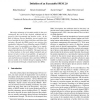Free Online Productivity Tools
i2Speak
i2Symbol
i2OCR
iTex2Img
iWeb2Print
iWeb2Shot
i2Type
iPdf2Split
iPdf2Merge
i2Bopomofo
i2Arabic
i2Style
i2Image
i2PDF
iLatex2Rtf
Sci2ools
APSEC
2007
IEEE
2007
IEEE
Definition of an Executable SPEM 2.0
One major advantage of executable models is that once constructed, they can be run, checked, validated and improved in short incremental and iterative cycles. In the field of Software Process Modeling, process models have not yet reached the level of precision that would allow their execution. Recently the OMG issued a new revision of its standard for Software Process Modeling, namely SPEM2.0. However, even if executability was defined as a mandatory requirement in the RFP (Request For Proposal), the adopted specification does not fulfill it. This paper presents a critical analysis on the newly defined standard and addresses its lacks in terms of executability. An approach is proposed in order to extend the standard with a set of concepts and behavioural semantics that would allow SPEM2.0 process models to be checked through a mapping to Petri nets and monitored through a transformation into BPEL.
| Added | 12 Aug 2010 |
| Updated | 12 Aug 2010 |
| Type | Conference |
| Year | 2007 |
| Where | APSEC |
| Authors | Reda Bendraou, Benoît Combemale, Xavier Crégut, Marie-Pierre Gervais |
Comments (0)

